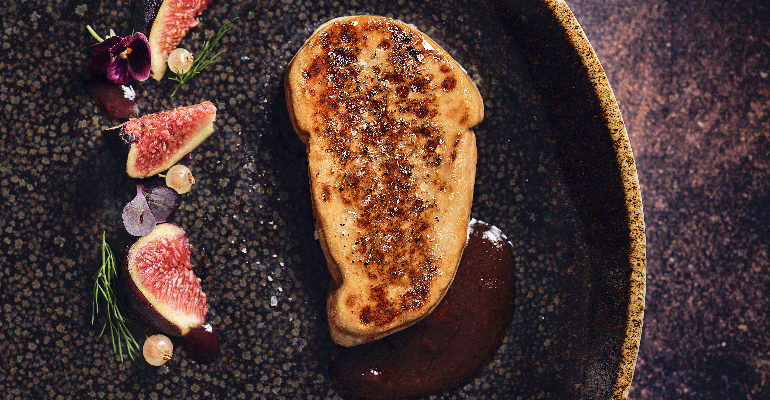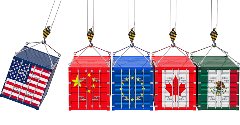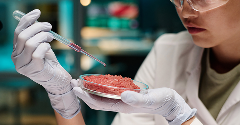News
Will ‘foie gras’ become the EU’s first approved cultivated meat?
20 Aug 2024French startup Gourmey has submitted its cultivated foie gras for approval in the European Union (EU), signalling the first application of its kind in the region.
Last month, the cultivated meat producer announced it was seeking authorisation for its meat-free foie gras in five markets. The Paris-based food pioneer has requested approval for market access in Singapore, the US, the UK, Switzerland, and the EU.

Gourmey, which specialises in developing premium cultivated foods, has filed applications with the Singapore Food Agency (SFA), the US Food and Drug Administration (FDA), the UK’s Food Standards Agency (FSA), the Swiss Federal Food Safety and Veterinary Office (FSVO), the European Commission (EC), and the European Food Safety Authority (EFSA).
Gourmey’s cultivated foie gras
“It’s fantastic to see the first application to sell cultivated meat in the EU has been submitted,” Alex Holst, deputy head of policy at the Good Food Institute (GFI) Europe, told Ingredients Network.
Gourmey hopes that its flagship cultivated duck product will give foie gras consumers, chefs, and restaurants worldwide an alternative to the traditional animal-protein counterpart.
“This submission marks a significant milestone for the sector and, if approved, means European consumers will for the first time be able to try cultivated meat for themselves, eating delicious foie gras made in a way that could reduce environmental impacts and animal welfare concerns, while supporting investment and providing future-proof jobs,” Holst said.
The first application for cultivated meat is a welcome step in the sector.
“It also demonstrates that food innovations such as cultivated meat are able to coexist alongside Europe’s gastronomic traditions – something that is vitally important, as food culture is central to people’s national identities,” Holst added, speaking on the significance of Gourmey’s application.
The environmental case for cultivated meat
Cultivated foods and proteins use cell culture technologies to take animal cell samples and turn them into muscle, fat, or other tissues.
Cultivated meat requires as much as 90% less land than animal protein, indicating that it could support sustainable agriculture by offering more land for nature-friendly methods. Adopting cultivated meat could also enhance Europe’s food security by lowering the reliance on crops grown abroad to feed animals.
A 2023 research study suggested that cultivated meat could cause up to 92% less greenhouse gas (GHG) emissions, up to 94% less air pollution, and use up to 66% less water than conventional beef.
In a Gourmey-commissioned study focusing on scalable production, the company reported that its technology significantly lowers the environmental footprint of foods compared with conventional production in the same product category. In particular, it lowers GHG emissions and land and water use.
“Diversifying protein production is crucial for sustaining food security and contributing to sustainability objectives such as decarbonisation and biodiversity. Integrating cultivated food production into existing agrifood value chains provides a complementary protein source that will contribute to resilient food systems,” said Nicolas Morin-Forest, CEO of Gourmey.
Cultivated meat can also be made without antibiotics, with a 2022 research study indicating that it can help to decrease the risk of antimicrobial resistance.
Gourmey avoids using antibiotics during production. The French brand’s cultivation process is free from animal-derived components such as foetal bovine serum, which ensures no animal-based protein makes its way into its final products.
Gaining regulatory approval in the EU
The US, Singapore, and Israel have already approved the sale of cultivated foods. This is the first time a company is seeking novel food approval for cultivated food from the EC. In Europe, any cultivated meat product must receive approval from the EC before it can be sold.
The market authorisation process for cultivated meat is regulated by the novel food regulation. Gourmey does not use gene-edited or genetically modified cells, so its application falls within the scope of the regulation.
Once the European Commission approves a cultivated meat product, it can be marketed and sold in all 27 EU countries. The approval process involves a comprehensive evaluation of a cultivated meat’s safety and nutritional content, and it is expected to take a minimum of 18 months.
“Experts can now get to work, using one of the world’s most rigorous regulatory processes to assess the safety and nutritional qualities of cultivated meat,” said Seth Roberts, senior policy manager at GFI Europe.
Morin-Forest said: “We are confident that our products will meet these highly demanding standards so that everyone who wants to can enjoy new gourmet experiences all around the world.”
Related news

Future F&B flavours favour exploration and explosive taste profiles
25 Mar 2025
Exploration and experimentation will define the future of flavour, according to Mintel, as consumers seek out taste profiles and textures that offer an adventurous eating experience.
Read more
Partnership plans to scale cultivated meat production
21 Mar 2025
Food technology innovator Ever After Foods (EAF) and multinational food leader Bühler are striving to overcome hurdles to access and accelerate the development of cultivated meat.
Read more
Global consumers enjoy food less and perceive it as less healthy
20 Mar 2025
Enjoyment of food and its perceived healthiness is dwindling among most global populations, according to findings from Gallup and Ando Foundation/Nissin Food Products.
Read more
Seafood set to ‘dethrone’ poultry as protein growth king
19 Mar 2025
Seafood is poised to surpass poultry as the leading contributor to global protein supply growth this year, according to Rabobank’s latest protein outlook.
Read more
Tariff volatility leaves food manufacturers in limbo
11 Mar 2025
Rapid US trade policy shifts and tariff escalations are creating uncertainty for food manufacturers and ingredient suppliers.
Read more
F&B industry hit with fresh greenwashing claims
26 Feb 2025
The food and beverage (F&B) industry is under fresh scrutiny amid claims of greenwashing, with Arla the latest company in the firing line.
Read more
Protein diversification: A massive missed market?
20 Feb 2025
Germany and the UK could be missing out on the massive market for alternative meats and proteins, with one new coalition calling for an end to the “steak-tofu struggle”.
Read more
Have scientists discovered a new tool to measure UPFs?
19 Feb 2025
Researchers have developed a new scoring system and database, compiling over 50,000 food items, of which over 1,000 are classified as ultra-processed.
Read more
China ramps up cultivated meat research with new innovation base
18 Feb 2025
China has opened its first fermentation and cultivated meat research centre in Beijing.
Read more
Most consumers lack trust in AI, but supplement users are ready to embrace the technology
14 Feb 2025
A survey of UK and US consumers found that most supplement users are willing to let AI make decisions on their behalf, but they also demand greater transparency.
Read more